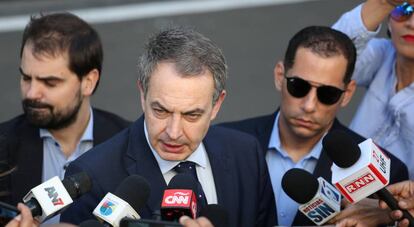Former Spanish PM sides with Venezuela’s Maduro over elections
International mediator José Luis Rodríguez Zapatero urges opposition to accept government conditions

Former Spanish prime minister José Luis Rodríguez Zapatero has sent a letter to Venezuelan opposition members engaged in talks with the government of Nicolás Maduro, urging them to accept a draft agreement reached during bilateral meetings in Dominican Republic.
Zapatero, who headed a Socialist government in Spain from 2004 to 2011, has been acting as a mediator between the parties along with Dominican president Danilo Medina. The months-long talks broke down after failure to reach a deal on how to organize fair presidential elections in Venezuela.
Zapatero described the deal as “a real and brave hope for the future of Venezuela”
In his letter, Zapatero said that “in a way that was unexpected to me, the document was not subscribed to by opposition representatives. I will not delve into the circumstances and motives for this, but it is my duty to defend the truth, and I am committed to not giving up on the chance to reach a historic agreement among Venezuelans.
“I ask you, with peace and democracy in mind, for your organization to formally subscribe the agreement herein included, now that the government has pledged to scrupulously respect the agreed terms,” adds the letter.
The former Spanish PM writes that his request is a result of his own “deep belief in the need for this agreement and my commitment to see its terms honored.”
Carta del ex jefe del gobierno español, José Luis Rodriguez Zapatero a la oposición venezolana. pic.twitter.com/MQR9xOaQlQ
— Osmary Hernandez (@osmarycnn) February 8, 2018
Letter from former Spanish head of government José Luis Rodríguez Zapatero to the Venezuelan opposition.
Venezuela will hold presidential elections on April 22. The date was one of the stumbling blocks at the negotiating table: the government wanted to hold them by April at the latest, while the opposition wanted them no earlier than June.
Opposition representatives also demanded a lift on the current ban stopping their own main leaders from running in the election. The main opposition figures are two-time presidential candidate Henrique Capriles and Leopoldo López, under house arrest.
Venezuela will hold presidential elections on April 22
The opposition wants “the immediate legalization in under 48 hours” of the Democratic Unity Roundtable (MUD) and of the political parties Primero Justicia (Justice First), which is headed by Capriles, as well as Voluntad Popular (Popular Will), led by López. Both of these parties have been left out of the presidential race by judicial and electoral authorities, which the opposition accuses of being subservient to the Maduro government.
The main negotiator for MUD, Julio Borges, said that his proposals – which included details about international observers, audits, voter rolls and campaigning – are aimed at guaranteeing “free elections,” something that Maduro fears, he said.
“Brave hope”
In his letter, Zapatero said that the talks in Dominican Republic had led to a basic consensus for a broad agreement that he described as “a real and brave hope for the future of Venezuela.”
Dominican leader Danilo Medina said that talks have entered “an indefinite recess” after the opposition refused to add their name to a draft document signed by Nicolás Maduro, on the grounds that it was insufficient.
International observers at the talks included Bolivia, Nicaragua, St. Vincent and the Grenadines, Mexico and Chile. Mexico pulled out after a date was set for the presidential election, while Chile did the same after ascertaining that no agreement has been reached to create “the minimum conditions for a democratic presidential election.”
On Thursday, the European Parliament passed a resolution asking for increased sanctions against high-ranking Venezuelan officials, including President Maduro himself. The chamber also expressed condemnation for Venezuela’s recent decision to expel the Spanish ambassador to that country.
English version by Susana Urra.
Tu suscripción se está usando en otro dispositivo
¿Quieres añadir otro usuario a tu suscripción?
Si continúas leyendo en este dispositivo, no se podrá leer en el otro.
FlechaTu suscripción se está usando en otro dispositivo y solo puedes acceder a EL PAÍS desde un dispositivo a la vez.
Si quieres compartir tu cuenta, cambia tu suscripción a la modalidad Premium, así podrás añadir otro usuario. Cada uno accederá con su propia cuenta de email, lo que os permitirá personalizar vuestra experiencia en EL PAÍS.
¿Tienes una suscripción de empresa? Accede aquí para contratar más cuentas.
En el caso de no saber quién está usando tu cuenta, te recomendamos cambiar tu contraseña aquí.
Si decides continuar compartiendo tu cuenta, este mensaje se mostrará en tu dispositivo y en el de la otra persona que está usando tu cuenta de forma indefinida, afectando a tu experiencia de lectura. Puedes consultar aquí los términos y condiciones de la suscripción digital.








































